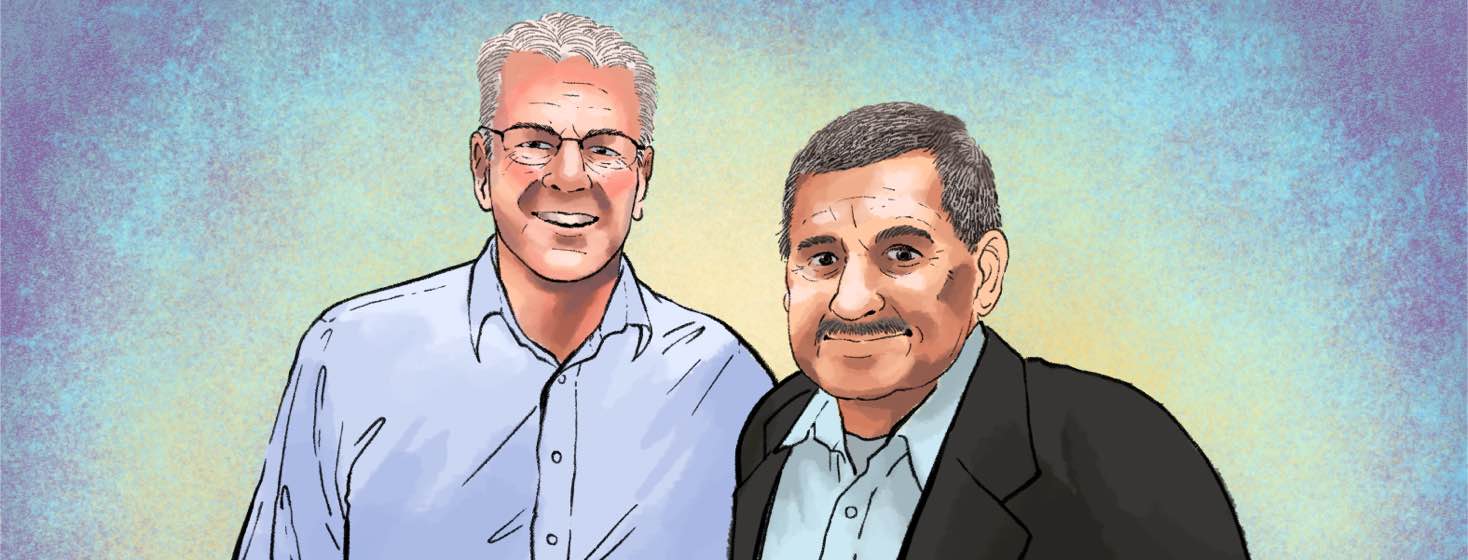Community Spotlight: Simon and Bill - Part 1
Bill West was diagnosed with prostate cancer in 2010. His husband, Simon Rosser, was diagnosed in 2016. They talk about what they learned from their diagnoses and how they've supported each other, and highlight the need for more resources and awareness of gay and bisexual people with prostate cancer. Read Part 2.
Getting diagnosed and choosing treatment
Tell us each about your diagnosis and the treatment path you chose.
Bill: In 2010, I had a biopsy which indicated prostate cancer. We were very clear that we were a gay couple, but treatment choices and outcomes were presented as if ‘men are men’ with no understanding of gay sexuality. I took two months to decide, but in retrospect, given the abundance of misinformation and the state of shock this diagnosis creates, treatment decisions were neither informed nor objective. I ended up having robotic assisted prostatectomy.
Simon: I was diagnosed in 2016 and remain on active surveillance. Since my initial biopsy to confirm the diagnosis, I get my PSA retested every 3-6 months to monitor, and have had a second biopsy since then.
Simon, how has your husband's experience of going through treatment influenced your decision on active surveillance?
Simon: If I had not seen Bill’s experience, I would have probably chosen surgery. I don’t handle anxiety all that well, and the immediate impulse with any cancer diagnosis is to get it out. But seeing the sexual and urinary challenges that Bill went through, and some he still lives with, I’m really happy to be on active surveillance.
My initial goal was to keep my prostate for as long as possible. Now, after some genetic testing that suggests I have the non-aggressive kind and four years on surveillance (with my PSA only increasing very slowly), I’m hoping that I get to keep it always.
Being a supportive partner
What does being a supportive partner through a prostate cancer diagnosis mean to you, and how have your roles evolved over time?
Simon: I think both of us having prostate cancer has helped us support each other. It’s really kind of nice that both of us are just us, rather than one being the patient and the other being the support person. We are both to each other.
I think initially I was in shock, and given my Dad died of prostate cancer, I was fearful for Bill. But over time, I think we have achieved a good balance where we are each other’s support. So, if one of us has a medical appointment, the other may come to take notes, remember questions to ask, observe and support. Clinically, we respect our partner’s right to make his own decision about health. And we both agreed to make our sex life a priority. This reinforces that we’re a team, doing this together.
Bill: Because I went through this process first, I quickly realized that I wasn’t telling people about my diagnosis because I didn’t want to have to nurse them and bring them up to speed on what “gay” and “cancer” and “survivor” meant. I needed to sort myself out first. When Simon was diagnosed, I concluded that simple presence was real support, so I was there but gave him time to process what it meant for him, then for us as a couple.
A lack of resources for gay men
Many prostate cancer resources focus on the experiences of straight men. What challenges did you face finding resources for gay men?
Simon: I’m a professor specializing in gay men’s health research. So, when Bill was diagnosed one of the first things I did was a literature search. I could not believe how little research there was on gay men and prostate cancer. This is the most common cancer men like us have, and there was almost nothing. So, I decided to write a grant to study the effects of prostate cancer on sexual minority patients. Now, I lead the first large NIH-funded rehabilitation study tailored for gay and bisexual prostate cancer patients.
Bill: The best resource is a primary physician that you can train. My physician and I have reached an agreement. It’s clear that this is my body, and I get to make the decisions. When I don’t understand a medical procedure or medication, he teaches. When I don’t think he gets something about the difference about myself as a gay man, I teach him. I trust him because he knows me, he knows Simon, he asks about our kids and grandkids, and we make decisions together.

Join the conversation